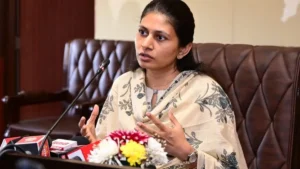Ravichandran Ashwin, one of India’s premier spinners, has announced his retirement from international cricket at the end of the third Border-Gavaskar Trophy Test in Brisbane on December 18, 2024. The announcement marked the conclusion of a remarkable 14-year international career. Known for his tactical brilliance and record-breaking achievements, Ashwin’s retirement follows a stellar career in which he became one of India’s greatest match-winners. He leaves behind a legacy as the second-highest wicket-taker for India in Test cricket and one of the most versatile bowlers in the history of the game.
Key Points
Retirement Announcement
- Ashwin announced his retirement after India’s draw in the third Border-Gavaskar Trophy Test in Brisbane.
Career Overview
- Ashwin played 106 Test matches, taking 537 wickets, making him India’s second-highest Test wicket-taker.
- He holds 37 five-wicket hauls in Test cricket, ranking second behind Muttiah Muralidaran (67).
- His career spanned 287 international matches, with Ashwin also excelling in ODIs (116 matches) and T20Is (65 matches).
Notable Achievements
- Ashwin ranks seventh on the all-time list for Test wickets with 537 scalps.
- He holds the record for dismissing the most left-handed batsmen in Test cricket (268).
- He was the first bowler to take 100 wickets in the World Test Championship and remains the highest wicket-taker in the WTC with 195 wickets.
- Ashwin is also a useful lower-order batsman, with 3503 runs in Tests, including six centuries and 14 fifties.
- Record for Century and Five-Wicket Haul: He holds the Indian record for the most instances (4) of a century and a five-wicket haul in the same Test.
Legacy in Indian Cricket
- Ashwin played a crucial role in India’s success in the World Test Championship and helped fill the key role of a spin bowler alongside other legends of the game.
International Farewell
- Ashwin’s final Test appearance was at Adelaide during the ongoing Border-Gavaskar Trophy.
- He received praise from Australian bowler Nathan Lyon, who spoke highly of Ashwin’s skill and character on and off the field.
Franchise Cricket
- Despite his retirement from international cricket, Ashwin is expected to continue playing in the IPL and has recently secured a contract with Chennai Super Kings for Rs 9.75 crore in the IPL 2025 Mega Auction.
Retirement Impact
- His retirement marks the end of an era for India’s spin bowling and will be felt deeply within the cricket community.
| Summary/Static | Details |
| Why in the news? | Ashwin’s Retirement: A Historic Cricket Career Concludes |
| Retirement Announcement | Ravichandran Ashwin announced his retirement after the third Border-Gavaskar Trophy Test in Brisbane (Dec 18, 2024). |
| Test Career | Played 106 Test matches, took 537 wickets, second-highest Test wicket-taker for India. |
| ODIs and T20Is | Played 116 ODIs (156 wickets) and 65 T20Is (72 wickets). |
| Records | – Seventh on all-time Test wicket list (537 wickets).
– Record for most left-handed batsmen dismissed in Test cricket (268). |
| Five-Wicket Hauls | 37 five-wicket hauls in Test cricket, second only to Muttiah Muralidaran’s 67. |
| Unique Feat | Holds the Indian record for the most instances (4) of a century and a five-wicket haul in the same Test, second only to Ian Botham (5). |
| World Test Championship | First bowler to take 100 WTC wickets, highest wicket-taker with 195 wickets in WTC. |
| Batting | 3503 Test runs, including 6 centuries and 14 fifties. |
| Legacy | Ashwin leaves a significant legacy in Indian and world cricket, particularly in Test cricket, and continues to influence the game. |
| Final Test | His last Test appearance was in Adelaide during the Border-Gavaskar Trophy series. |



 Finn Allen Creates History With Fastest ...
Finn Allen Creates History With Fastest ...
 Indian Women’s Cricket Team Nominated fo...
Indian Women’s Cricket Team Nominated fo...
 Raksha Khadse Announces Special Edition ...
Raksha Khadse Announces Special Edition ...








